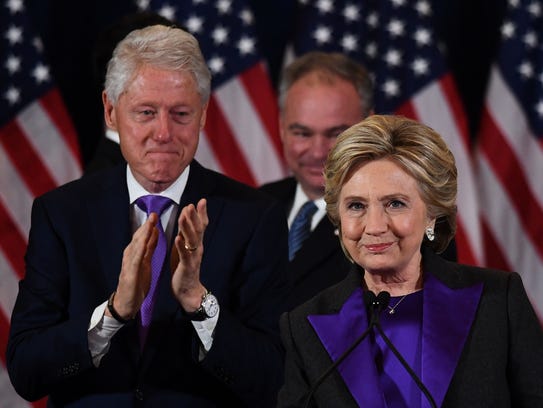
This article is more than
9 year old
Hillary Clinton ended her historic presidential campaign with a speech she said is “painful and will be for a long time,” while also offering Donald Trump an unequivocal concession as she urged for a peaceful transfer of power.
“Donald Trump is going to be our president,” she said. “I hope that he will be a successful president for all Americans," Clinton said to a room of emotional aides and supporters, who gave her an extended round of applause.
“We have seen that our nation is more deeply divided than we thought. But I still believe in America and always will. And if you do, then we must accept this” election outcome, she added. “We owe him an open mind and a chance to lead.”
Clinton’s vice presidential running mate, Tim Kaine, introduced her and addressed the unique challenge the former secretary of State faced in her bid to become the nation's first female president.
“She has been and is a great history maker,” he said, citing her work as a civil rights lawyer, first lady, senator and secretary of State. “She has made history in a nation that is good at so many things, but that’s made it uniquely difficult for a woman to be elected to federal office; she became the first major party nominee.”
He also noted that, just like Democrat Al Gore in 2000, Clinton appears to have won the national popular vote.
Clinton made it clear that while Americans must “cherish” the Constitution’s democratic tradition of a peaceful transfer of power, they should fight to protect its core values of the rule of law, equal rights and freedom of worship. These are all Constitutional protections her campaign had argued were at risk with a Trump presidency.
In closing her remarks Clinton made a direct appeal to young people and women of all ages.
To young people, she said: “This loss hurts, but please never stop believing that fighting for what’s right is worth it.”

As the first female to lead a major U.S. political party's presidential ticket, she concluded her concession urging the women who supported her not to lose faith in their dreams.
“We have still not shattered that highest, hardest glass ceiling, but some day someone will. And hopefully sooner than we might think right now,” she said.
“To all the little girls who are watching this, never doubt that you are valuable and powerful and deserving of every chance and opportunity in the world to pursue and achieve your” dreams, she added.
Several hours earlier, Clinton had called Trump, to congratulate him on becoming the nation's president-elect. However, she did not make an appearance before backers gathered at the Jacob K. Javits Convention Center for what was expected to be a victory party.
Instead, her campaign chairman, John Podesta, made brief remarks. “It’s been a long night, and it’s been a long campaign, but I can say we can wait a little longer," he told Clinton's despondent supporters.
Outside the New Yorker hotel in Manhattan, where Clinton would deliver her concession remarks, disappointed supporters, many still wearing their guest badges from the previous night's campaign event, tried to get in to see their defeated candidate.
Anita Broccolino said she wanted to get into the event "to show support for Hillary, to show her we love her."
The loss was a shock to the Clinton team after most major polls showed her with a comfortable lead in all of the major battleground state, including Pennsylvania and Michigan, two blue-leaning states that are critical, particularly for Democrats. Prior to Trump's win there, a Republican hadn't won Pennsylvania since 1988.
A few weeks ago, Clinton's lead was even more pronounced. Following the third debate in Las Vegas, in which Trump called Clinton a "nasty woman" and said he might not honor the outcome of the election, an ABC News tracking poll showed Clinton leading the GOP nominee by 11 points.

Later in the month, FBI Director James Comey announced that his agency was reviewing new emails that might be relevant to its investigation of her private email server, but just two days before the election, Comey said the emails were either duplicates or not germane and that he was making no change in his previous recommendation against criminal charges.
Still, the move revived the one issue that had proved most damaging to Clinton's candidacy — and her poll numbers began to reflect it.
Additionally, news organizations, including Fox News, falsely reported that she would be indicted in a separate investigation related to her family's charitable foundation.
Clinton responded on the campaign trail by shifting her message to take aim at Trump, even warning at several rallies that the real estate mogul's temperament risked a global nuclear war. On the eve of the election, Clinton told supporters in Grand Rapids, Mich., that there was no veto over a presidential decision to launch a nuclear weapon and that it takes just four minutes to launch one.
Democrats will now begin a long process of soul searching. During the heat of the campaign, they had remained optimistic that a number of the setbacks they'd encountered, including the WikiLeaks email hack linked to Russia, were survivable.
They were wrong.
Contributing: Eliza Collins in New York